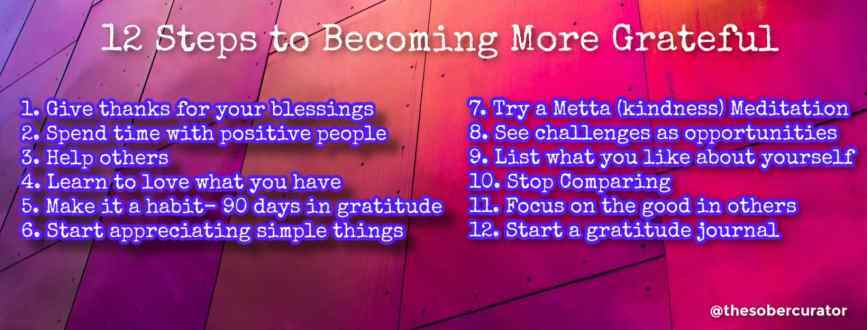- The Sober Sip powered by The Sober Curator
- Posts
- Steps to Gratitude and the Science of How it Works
Steps to Gratitude and the Science of How it Works
Buddha says gratitude is the open door to abundance. Recovered alcoholics say it’s a way of life. We hear people talking about it like it’s the secret sauce, the magic potion, or the genie in the bottle. Speaking from personal experience, I can say after putting the bottle down, gratitude is definitely the most direct route to happiness. But why is this? How do we get there and how does it work? There are practical steps to gratitude and we are going to show you some. So, read on friends!

There is power in gratitude. Focusing on your blessings and what you have keeps you grounded and in the present. But no matter how bad it gets, we see that things could always be worse. And there is always a silver lining. If we choose to see it. However, people starting in recovery are usually coming off a pretty rough ride including homelessness, unemployment, failing health, wrecked relationships, and/or legal issues. Gratitude is not usually top of mind.
Becoming grateful for all your experiences allows you to help others
This does take time. But when we are finally able to shift focus from the negative to the positive, we are able to be grateful for these experiences and use them to help others. We are promised this in the steps. I’ve seen it happen more times than I can count, to me and to almost all of my fellows.
Becoming a grateful alcoholic and seeing people in recovery sharing their experiences to help others is enough for me to believe. Being in gratitude feels good but now we have scientific proof showing why and that gratitude is actually good for your health. Here’s an excerpt from Daily Health Post, Editorial “Neuroscience Reveals: Gratitude Literally Rewires Your Brain to be Happier” to explain.

In a neurological experiment, brain activity was measured using magnetic resonance imaging as subjects were induced to feel gratitude by receiving gifts. The areas of the brain showing increased activity were the anterior cingulate cortex and medial prefrontal cortex. Those are associated with moral and social cognition, reward, empathy, and value judgment. This led to the conclusion that the emotion of gratitude supports a positive and supportive attitude toward others and a feeling of relief from stressors.
Improved sleep and stress levels
Gratitude activates the hypothalamus as well, with downstream effects on metabolism, stress, and various behaviors. The hypothalamus is located at the base of the brain and regulates hormones responsible for many critical functions, such as body temperature, emotional responses, and survival functions like appetite and sleep. One of the neurochemicals associated with the parts of the brain affected by gratitude is dopamine, a pleasure hormone.

The positive influence of gratitude on mental health continues past a particular event if the emotion is relived. A simple gratitude writing intervention was associated with significantly greater and lasting neural sensitivity to gratitude. Subjects who participated in gratitude letter writing showed both behavioral increases in gratitude and significantly greater neural modulation by gratitude in the medial prefrontal cortex three months later.
Becoming grateful promotes feelings of self worth and compassion
In fact, this lasting effect is psychologically protective. In adolescents, feelings of gratitude have shown an inverse correlation with bullying victimization and suicide risk. Gratitude affects brain function on a chemical level and its practice promotes feelings of self-worth and compassion for others.
Focusing on the positive and feeling grateful can improve your sleep quality and reduce feelings of anxiety and depression. Furthermore, levels of gratitude correlate to better moods and less fatigue and inflammation, reducing the risk of heart failure, even for those who are susceptible.

The magic in it
With the unbelievable benefits to mind, body, and soul, gratitude may actually be magic! It sounds too good to be true. But the fantastic news is that it’s real. Gratitude is available to all and it’s FREE! AND…there are practical steps to gratitude you can take right now!
To help you get started, we’d like to share a few resources. There are several podcasts that explore gratitude and the effects it has on others. A few of our favorites are The Happiness Lab, Be Grateful Anyway, The Gratitude Podcast. These are binge-worthy but inspire a shift in thinking after listening to just one episode. (Check out other awesome podcasts here)

We also love The Five Minute Journal App ($4.99) It’s a simple, engaging way to stay in gratitude. There are morning and evening prompts AND you get to upload a picture. It’s also really fun to go back and look at the photos and remember what was important on any given day.
And …..The Sober Curator is kicking off a 30-Day Gratitude Challenge! We will share an activity to help you get into gratitude every day in the month of November on our Instagram @thesobercurator. Here’s a sneak peek!

L
If you or a loved one is battling addiction, please ask for help.
If you or someone you know is experiencing difficulties surrounding alcoholism, addiction, or mental illness, please reach out and ask for help. People everywhere can and want to help; you just have to know where to look. And continue to look until you find what works for you. Click here for a list of regional and national resources.

SOBERSCRIBE & BE ENTERED TO WIN!
Resources are available
If you or someone you know is experiencing difficulties surrounding alcoholism, addiction, or mental illness, please reach out and ask for help. People everywhere can and want to help; you just have to know where to look. And continue to look until you find what works for you. Click here for a list of regional and national resources.
The post Steps to Gratitude and the Science of How it Works appeared first on The Sober Curator.
Reply